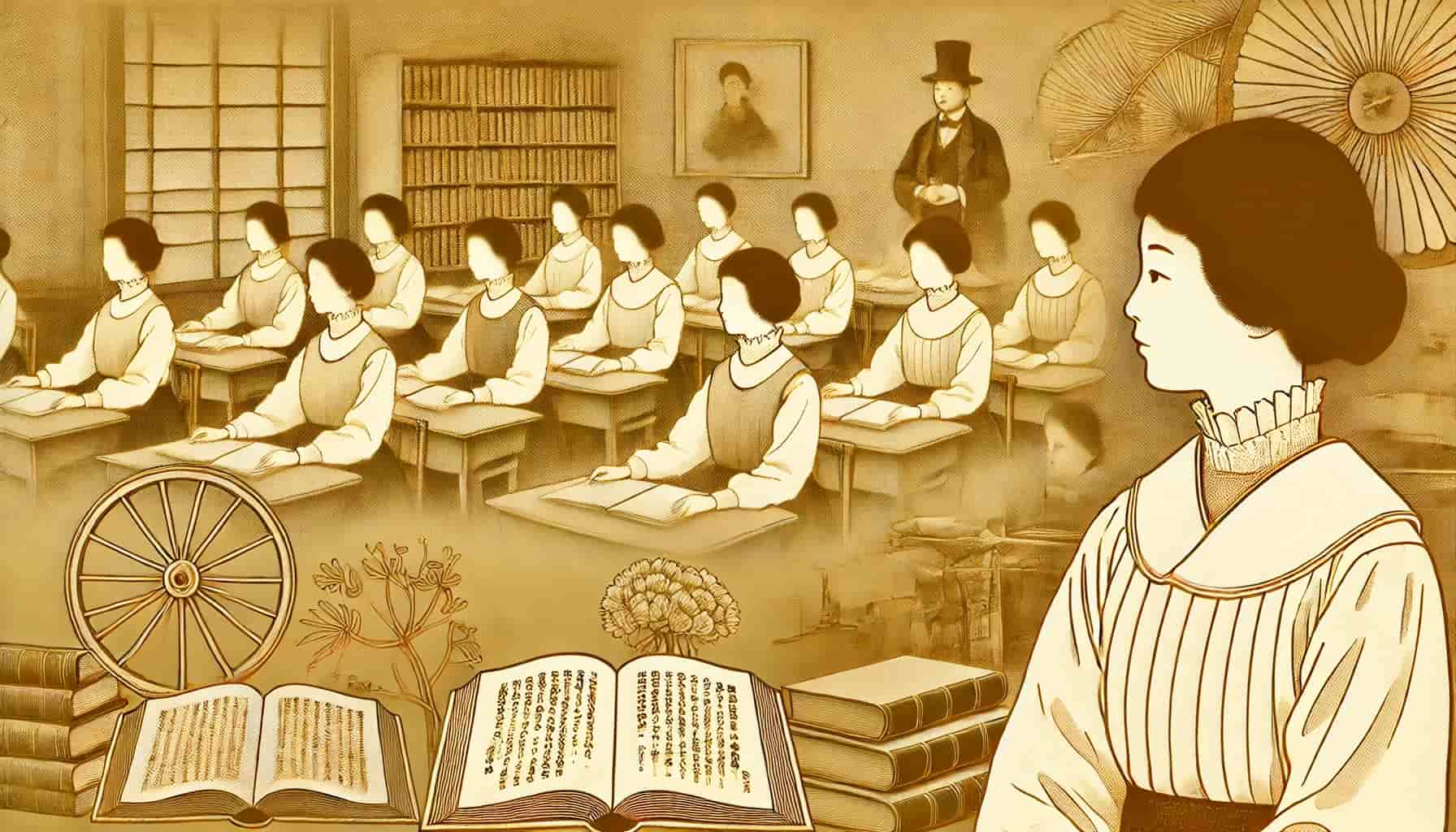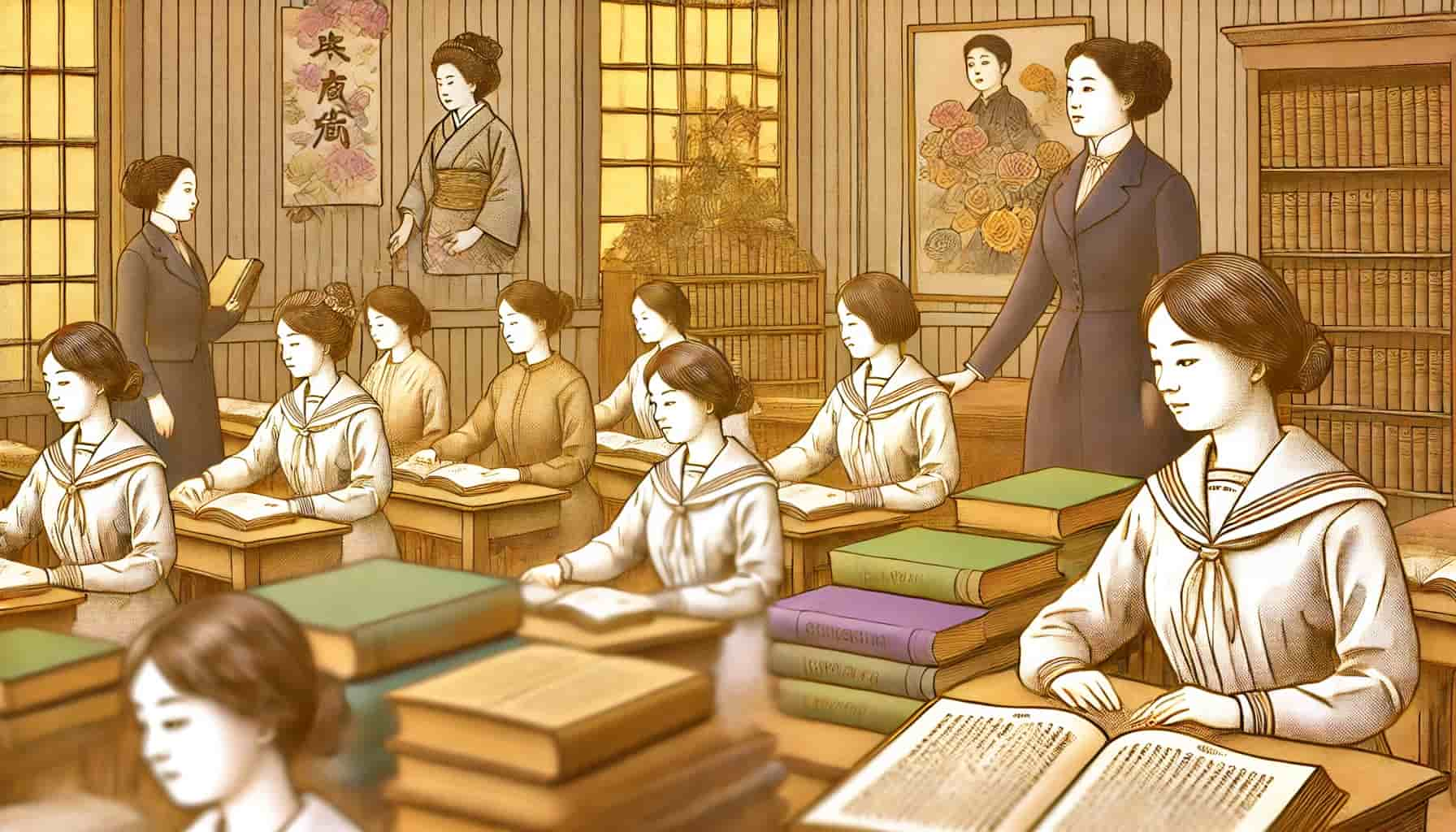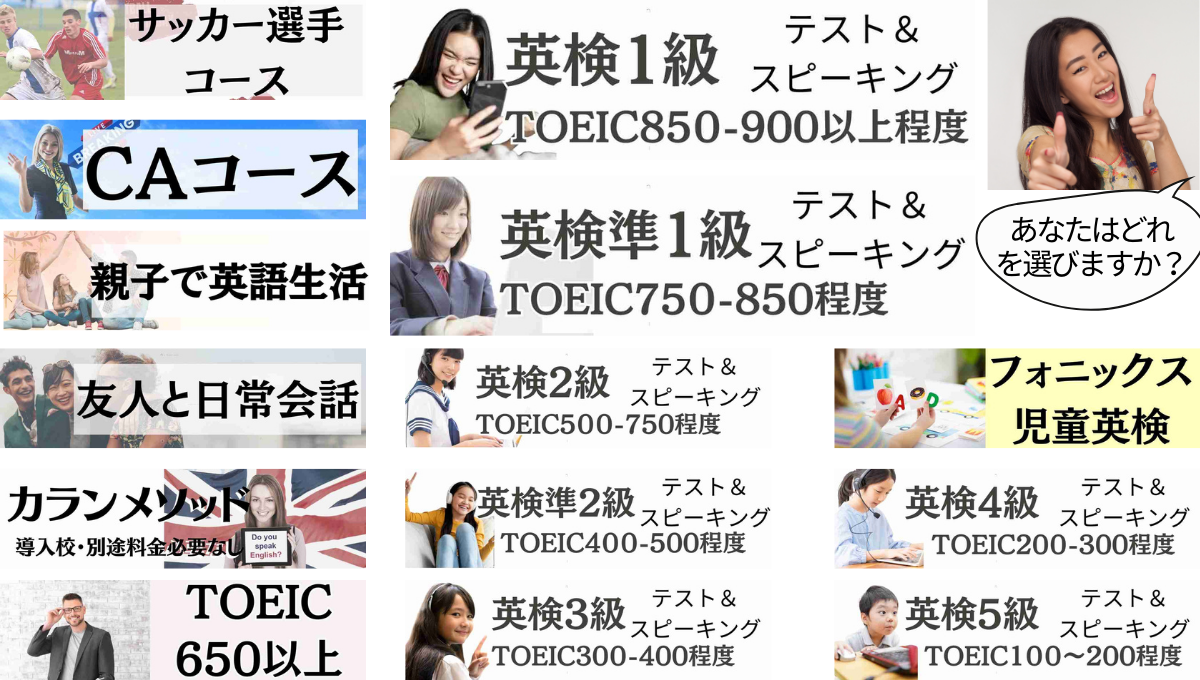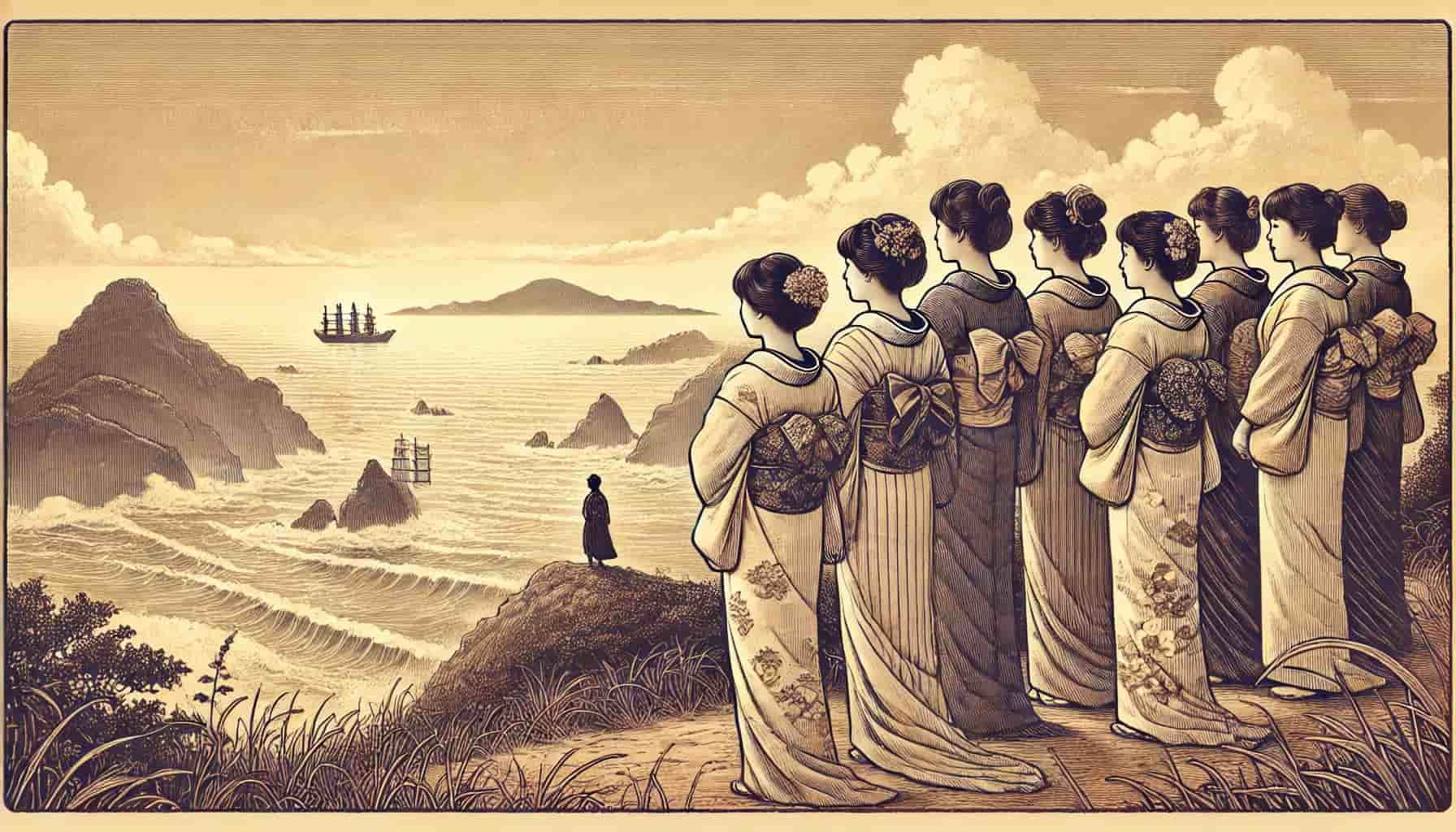First Japanese female exchange student. To the U.S.
この英語教材のテーマは「実際の出来事でカジュアルな英語を学ぶ」
The theme of this English resource is “Learn casual English through real events.”
Section 1: The Courage of the First Female Students
On November 12, 1871, Japan made a bold move by sending its first female students to the United States. These young women, part of the Iwakura Mission, were pioneers who faced many challenges. They left their families and homeland behind to explore an unfamiliar world, showing incredible courage and resilience. They truly had to “step out of their comfort zone“ to embrace the new opportunities that lay ahead.
Questions and Sample Answers
Q1: When did Japan send its first female students abroad?
A1: Japan sent its first female students abroad on November 12, 1871.
Q2: Which mission were the first female students part of?
A2: They were part of the Iwakura Mission.
Q3: What kind of challenges did these students face?
A3: They faced challenges like leaving their families and adapting to a new and unfamiliar world.
Now, let’s talk using idioms.
・Let the students choose one favorite idiom and make an example sentence.
Idiom: Step out of their comfort zone
Meaning: To do something that is different or challenging, often involving some level of discomfort.
Example: “Moving to a new country helped her step out of her comfort zone and grow as a person.”
セクション 1:初の女子留学生の勇気
1871年11月12日、日本は初の女子留学生をアメリカに派遣するという大胆な行動を取りました。これらの若い女性は、岩倉使節団の一員として、多くの困難に直面しながらも先駆者としての役割を果たしました。彼女たちは家族や故郷を離れ、未知の世界を探求するために旅立ち、素晴らしい勇気と忍耐力を示しました。彼女たちは本当に新たな機会を受け入れるために「自分の快適な場所から抜け出す」必要がありました。
質問とサンプル回答
Q1:日本が初めて女子留学生を海外に派遣したのはいつですか?
A1:日本は1871年11月12日に初めて女子留学生を海外に派遣しました。
Q2:初の女子留学生はどの使節団の一部でしたか?
A2:彼女たちは岩倉使節団の一員でした。
Q3:これらの学生はどのような困難に直面しましたか?
A3:彼女たちは家族を離れ、新しい未知の世界に適応するという困難に直面しました。
イディオム: Step out of their comfort zone
意味:慣れた環境を抜け出して、異なるまたは困難なことに挑戦すること。
例:「新しい国に移ることで、彼女は自分の快適な場所から抜け出すことができ、成長しました。」
Section 2: Learning and Growing in a Foreign Land

The first Japanese female students in the United States had to adapt quickly to new customs, language, and culture. They faced many difficulties, but they also gained valuable knowledge that would help them contribute to Japan’s future. These young women had to “hit the books“ hard to catch up with their American peers and understand the new educational system.
Questions and Sample Answers
Q1: What challenges did the first female students face in the United States?
A1: They had to adapt to new customs, language, and culture, as well as the educational system.
Q2: How did the female students try to succeed in their studies?
A2: They had to “hit the books” and study hard to catch up with their peers.
Q3: What was one benefit of studying abroad for these students?
A3: They gained valuable knowledge that they could use to help Japan in the future.
Now, let’s talk using idioms.
・Let the students choose one favorite idiom and make an example sentence.
Idiom: Hit the books
Meaning: To study very hard, often for a specific purpose.
Example: “She had to hit the books every night to prepare for her exams.”
セクション 2:異国の地での学びと成長
アメリカに渡った初の日本人女子留学生たちは、新しい習慣、言語、文化に迅速に適応しなければなりませんでした。彼女たちは多くの困難に直面しましたが、日本の未来に貢献するための貴重な知識も得ることができました。これらの若い女性たちは、アメリカ人の同級生に追いつき、新しい教育システムを理解するために、一生懸命に**「猛勉強する」必要がありました。彼女たちが「猛勉強する」**という決意は、この困難な機会を最大限に活用しようとする強い意志を示していました。
質問とサンプル回答
Q1:アメリカで初の女子留学生が直面した課題は何ですか?
A1:彼女たちは新しい習慣、言語、文化、そして教育システムに適応しなければなりませんでした。
Q2:女子留学生たちはどのようにして勉強で成功しようとしましたか?
A2:彼女たちは**「猛勉強する」**ことで同級生に追いつこうとしました。
Q3:留学することで彼女たちが得た利益の一つは何ですか?
A3:彼女たちは将来日本に役立てることができる貴重な知識を得ました。
イディオム: Hit the books
意味:特定の目的のために一生懸命に勉強すること。
例:「彼女は試験の準備のために毎晩猛勉強する必要がありました。」
Section 3: The Impact on Japan

After their time abroad, these young women returned to Japan with new perspectives and skills that were rare at the time. Their experiences helped to lay the groundwork for women’s education and increased opportunities in Japan. By studying abroad, they helped Japan “bridge the gap“ between traditional values and modern knowledge, contributing to the nation’s progress.
Questions and Sample Answers
Q1: What impact did these female students have on Japan when they returned?
A1: They contributed to women’s education and helped increase opportunities for women in Japan.
Q2: How did studying abroad help Japan’s progress?
A2: It helped “bridge the gap” between traditional values and modern knowledge.
Q3: What was one of the students’ main contributions after returning to Japan?
A3: They helped lay the groundwork for women’s education.
Now, let’s talk using idioms.
・Let the students choose one favorite idiom and make an example sentence.
Idiom: Bridge the gap
Meaning: To make a connection between two things that are different or separated.
Example: “The new program aims to bridge the gap between technology and older generations.”
セクション 3:日本への影響
海外での時間を経て、これらの若い女性たちは当時はまだ珍しかった新しい視点とスキルを持って日本に帰国しました。彼女たちの経験は、女性の教育と日本における女性の機会の拡大の基盤を築く手助けとなりました。留学を通じて、彼女たちは日本が伝統的な価値観と現代の知識の間の「溝を埋める」ことを助け、国の進歩に貢献しました。
質問とサンプル回答
Q1:これらの女子留学生は帰国後、日本にどのような影響を与えましたか?
A1:彼女たちは女性の教育に貢献し、日本における女性の機会を拡大する手助けをしました。
Q2:留学は日本の進歩にどのように役立ちましたか?
A2:それは伝統的な価値観と現代の知識の間の「溝を埋める」手助けをしました。
Q3:彼女たちが帰国後に行った主な貢献の一つは何ですか?
A3:彼女たちは女性の教育の基盤を築く手助けをしました。
イディオム: Bridge the gap
意味:異なるまたは分断された二つのものの間に橋渡しをすること。
例:「新しいプログラムは技術と高齢世代の間の溝を埋めることを目的としています。」



免責事項:
この英語教材はChatGPTを使用して生成した内容に手を加えて掲載しています。情報の正確性については十分注意を払っておりますが、誤りが含まれている可能性があります。この教材の利用によって生じた損害について、当方はいかなる責任も負いかねますので、ご了承ください。



